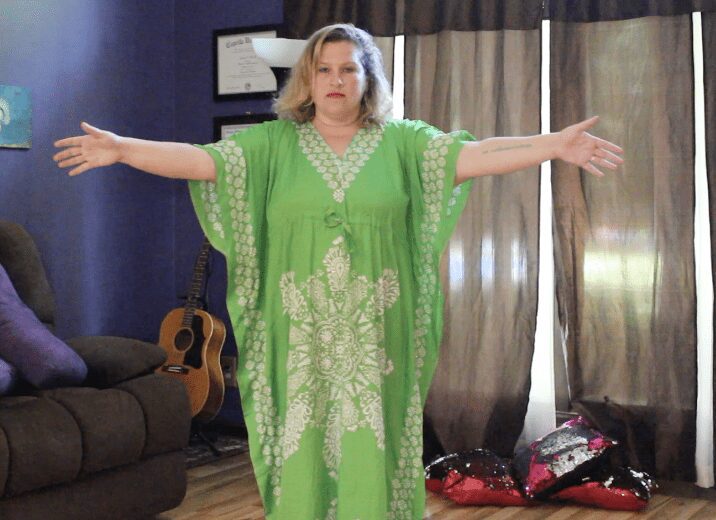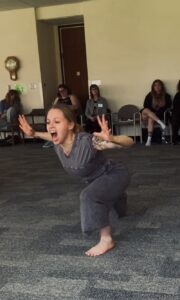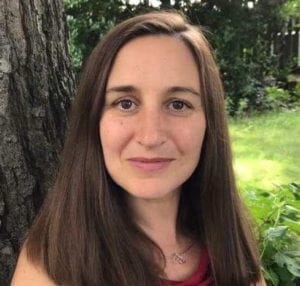Several years ago a workshop attendee came up to me after a continuing education class to pay me a compliment. The attendee relayed to me that his boss had warned him that although I knew my stuff, I was a bit “hippy dippy” for that person’s tastes.
Hippy dippy?
Because I teach breathing and grounding and mindfulness and yoga and advocate for inclusion of embodied practices—embodied practices that the first peoples of our Earth saw as vital to healing?
Okay—I’ll take “hippy dippy” as a compliment.
I am well-aware that I’ve existed on the fringes of what mainstream, Western psychotherapy models consider to be proper. In the last decade, I am delighted to see that the approaches I advocate have become more mainstream, especially eye movement desensitization and reprocessing (EMDR therapy), yoga and mindfulness-based interventions, and even energy work. While it’s true that a growing body of peer-reviewed research on such interventions has helped with larger acceptance by the Western therapeutic mainstream, quite frankly, it breaks my heart that this is needed to convince people. And even with the proliferation of this research, there are still traditional professors and very disembodied professionals in our field who will continue to call those of us who work with the total body-mind complex by any number of names: hippy dippy, weird, strange, woo-woo, granola, New Age… the list goes on.
I admit that I have often labeled myself in such ways to soften my approach or to attempt to build a bridge with colleagues or clients that I fear will judge me. And the time is now for us to stop using these descriptors, or if we do use them to try and bridge some good will, to be very careful about our language. In using these terms as pejoratives (which many of our colleagues will do) or as a tone softener, we are insulting the original healers of our planet and their healing traditions. We may even be insinuating that the healing traditions of these people—many if not most of whom are people of color—are somehow less than or inferior to what Western psychotherapy offers. I only realized how much this truly bothered me a few months ago when I would hear one of my colleagues who often assists me at trainings tell our trainees, “Yup, I do all of the hippy, woo-woo, granola stuff.” My colleague is a skilled psychotherapist who works with EMDR and DBT; she is also a reiki master, a yoga teacher, and is pursuing her Ph.D. in complementary and alternative medicine. In fairness to my colleague, for many years I often used such descriptors as a badge of honor to describe what I do, and kind of like reclaiming the word “queer” as a word of empowerment instead of an insult, it seemed to work for me.
Yet playing into these Western labels for healing practices that are usually Eastern or indigenous in origin advances the idea that modern, Western approaches to healing and psychotherapy are somehow superior because they’ve been researched in universities and branded with a stamp that says evidence-based by some accreditation body founded by white men. The more I’ve listened to my colleagues of color speak on their experiences with modern psychotherapy, especially those colleagues who have rich traditional training or lived experience in the healing practices of their tradition, the more I’ve realized that our language is a big part of the problem. Even if they are not attitudes that we as white helping professionals personally carry about non-Western and non-white healing practices like reiki/energy healing, drumming and dancing as healing arts, we may be complicit in promoting it when we use the same language that our judgmental peers use (e.g., weird, hippy, etc.). We are playing into subtle violence against indigenous people and their practices.
While I do agree that many of these practices need to be modified for Western audiences, many of whom are disembodied as a result of their own unrecognized wounding, I believe that any modern professional teaching of these practices must have a solid understanding of their origins. The more I began to deepen this journey for myself, the more concerned I became about the bigotry and closed-mindedness (or closed-bodiness) of many colleagues. I took a full yoga teacher training in a traditional Indian lineage, read work like The Four Fold Way by Angeles Arrien that fully explores the common practices of storytelling, singing, dancing, and silence as the first healing practices of our planet, and even explored how European healers like St. Hildegard of Bingen (1098-1179) connected those she served back to the earth and what she called “the greening power of God” (Viriditas). I am invested in learning more about the fine lines between cultural appropriation and cultural appreciation and adaptation, fueled by my growing concern that any white person can hang up a shingle and call themselves a Shaman.
In my teaching on EMDR therapy, I even go as far now as to say that Dr. Francine Shapiro, who is credited as the founder of EMDR therapy based on a walk in the park she took in 1987 that led to a serendipitous discovery she later researched, did not invent anything radically original. Yes, she did the hard work of codifying a protocol for using healing bilateral stimulation in a therapeutic way and to get it researched and accepted. And she knew she had to do this for something that seemed so “weird” to be accepted by the Western mainstream. Yet so many of the healing mechanisms of EMDR therapy—like mindfulness (which Shapiro studied at the time of her discovery) and bilateral stimulation (the main ingredient in drumming and dancing)—have been around in healing traditions since the dawn of time. Not to mention the fact that Shapiro was taking a walk in the park when she made her discovery, and being outside, not in an office, is imperative to healing in African traditions and would have been a main ingredient in Hildegard’s medicine.
I am not opposed to the advances of Western medicine or even some models of Western psychotherapy; by elevating them as complete and superior with our actions and even with the language we use, we can cause harm on many levels. And the subtle harm that comes through microaggressions, and promoting the values of coloniality and appropriation without credit, is still felt on many levels by people of color. As a white person, I am still working to best understand how I can be an ethical teacher of integrated content in a modern world, and one of the steps I want to take in my commitment to do better is to change up my language.
Instead of calling myself hippy-dippy or someone who does the weird stuff I am endeavoring to use language like, “I am an integrative therapist,” “I am a trauma-focused therapist which means I must be a body-centered therapist to truly be effective,” or “I work to blend tradition and innovation—and much of this innovation that we do as Western psychotherapists really is a callback to organic healing practices that existed long-before Freud.” For me, none of this is about rejecting the advances of modern medicine; it’s recognizing that the best integration exists when we can blend tradition with innovation. And being amazed that even modern medical research is showing that practices like energy healing and yoga may have been the vital missing piece all along in helping people to address the other disease-causing peril that accompanies modern life: Increases in toxic stress and shifting to a more mindless and less conscious existence.
I will admit that every once in a while when I explain how I work to people, a simple yet confident, “This may sound weird compared to what you’ve been exposed to in therapy so far,” yet think of the difference in meaning between that and “This is a weird therapy,” or “I do all the weird stuff—welcome to my office.” I also fully recognize that some of you may choose to embrace weird or some of these other labels as a badge of honor and while I appreciate that intention (I was there too for many years)—please consider that it’s ultimately not fair to the people who came before us nor will it help to truly normalize these approaches as powerful healing modalities in our modern society.















6 Responses
Every word of this. Beautiful!
Thank you Jamie. This resonates with me on so many levels personally and professionally.
This. All of this.
I have stopped dismissing my work as weird also. My 18 years of massage experience have given me many tools in my toolbox for healing and they don’t always just look like me rubbing someone’s body with my hands. But more profoundly, yesterday I had a intense emotional release with my physical therapist (who is a woman I’ve known since high school) around a psoas injury, who not only recognized it for the trauma it was associated with, but also gave me real, intimate support in processing what was happening, based on her collaboration with the pelvic therapist at her practice. It was a welcomed and humbling reminder that I am, you are, we are all body, mind, and soul and it might take non-mainstream practices to cleanup all our cobwebs. Thank you for your words, honesty, and authenticity, Jaime. How wonderful that we are the ones who get to bridge these modalities.
I love, love, love that you wrote this. My introduction to mindfulness was at a workshop you offered at a counselors’ conference in Puerto Rico. Ever since, I have been integrating mindfulness into my practice and now I explain to my clients that that is the framework I used for therapy/coaching. When explaining this approach, I will usually tell the client it may FEEL weird because it is so foreign to what we are used to. Then, I go into explaining the difference between our Western programming of dealing and controlling emotions and the mindfulness way of managing them through immersing ourselves in the present experience. I love how you use the term “integrative therapist” to describe your approach and I may very well begin using it as well, as the term “eclectic” doesn’t quite cut it for me anymore. Integrative sounds much more organic to the work I do, much of it inspired and guided by your work. Thank you Jaime for paving the way!
Yes, all of this. 🙂